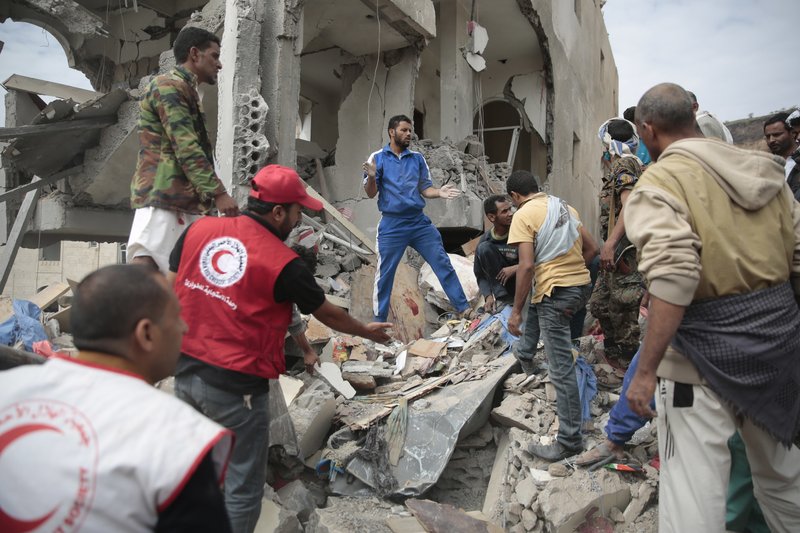CAIRO -- Saudi Arabia has barred Yemen's president, along with his sons, ministers and military officials, from returning home for months, Yemeni officials said, a sign of how much the leader-in-exile has been deeply weakened in a war fought in his name by the Saudi-led coalition against rebels in his country.
The officials said the ban was prompted by the bitter enmity between President Abed Rabbo Mansour Hadi and the United Arab Emirates, which is part of the coalition and has come to dominate southern Yemen, the portion of the country not under rebel control. Hadi and much of his government have been in the Saudi capital, Riyadh, for most of the war.
Saudi Arabia and the UAE are the two main pillars of the coalition, which is ostensibly defending Hadi's government against Iran-backed Shiite rebels known as Houthis.
The coalition has waged an air campaign against the rebels since 2015 and has a strong military presence in southern Yemen, but the Houthis still control the north.
Saudi Arabia on Sunday intensified its blockade on Yemen, closing down all traffic to Yemen's air and sea ports and closing land crossings. A United Nations agency warned ships to depart Houthi-controlled ports, and flights to airports in southern Yemen were canceled. As night fell, fuel prices spiked in Sanaa, with some petrol stations closed and drivers lined up to fill in their tanks fearing a worsening fuel shortage.
The coalition move came after the Houthis fired a missile toward Riyadh, their deepest strike into the kingdom.
Hadi's inability to get back to southern Yemen underscores the president's loss of authority -- even in the south that is nominally under his administration.
Since Hadi last left Yemen in February, he has repeatedly sent written requests to Saudi King Salman asking to return. None were processed, said a Yemeni security commander.
In August, Hadi even went to Riyadh airport, planning to return to his temporary capital, Aden, in southern Yemen -- but he was turned back, the commander said. Two other Yemeni officials confirmed that Hadi, his sons and several ministers with him in Riyadh have been prevented from going to Yemen. They spoke on condition of anonymity because they were not authorized to discuss the situation.
"The Saudis have imposed a form of house arrest on them," the commander said. "When Hadi asks to go, they respond it's not safe for him to return as there are plotters who want to take his life, and Saudis fear for his life."
Coalition spokesman Col. Turki al-Malaki referred any questions related to Hadi to his own office and government. Attempts to reach Yemen's foreign minister and government spokesman were unsuccessful.
Initially, the passports of several of Hadi's officials were seized -- though not Hadi's -- the commander said. They were given their passports back but still can't leave, he said.
Hadi's situation mirrors that of his predecessor, Ali Abdullah Saleh, the powerful former president who was ousted in 2011 and then joined ranks with the Houthis to take over the capital, Sanaa, in 2014. Their alliance appeared to fray this year amid reports the Houthis have put Saleh under house arrest.
The Emiratis distrust Hadi, accusing him of corruption and opposing his alliance with the Islah Party, Yemen's branch of the Muslim Brotherhood, according to the three officials and a politician close to Hadi.
In an attempt to move against UAE, Hadi held a meeting Thursday to discuss a Cabinet reshuffle to push out Emirati-backed members, but so far there have been no results from the meeting. The commander said Hadi is reluctant to defy Saudi Arabia because he "doesn't want to lose the Saudis."
Meanwhile, Saudi Arabia said on Monday that Iran had committed "a blatant act of military aggression" by providing its Yemeni allies with a missile fired at the Saudi capital over the weekend, raising the threat of a direct military clash between the two regional heavyweights.
The accusations represent a new peak in tensions between Saudi Arabia and Iran at a time when they are already fighting proxy wars in Yemen and Syria, as well as battles for political power in Iraq and Lebanon.
The Saudi statement said the missile could be considered an "act of war" against the kingdom and triggered its right to self-defense under international law.
It claimed that the rocket, which was fired from Yemen and intercepted en route to Riyadh, the capital, had originated in Iran. The Saudis said that "experts in military technology" had examined the debris of the missile, as well as one launched in July, and "confirmed the role of Iran's regime in manufacturing these missiles and smuggling them to the Houthi militias in Yemen for the purpose of attacking the kingdom."
Saudi Arabia's claims could not be independently verified.
The top commander of the Islamic Revolutionary Guards Corps in Iran called the accusation "baseless."
"These missiles were produced by the Yemenis and their military industry," Maj. Gen. Mohammad Ali Jafari told the semiofficial news agency Tasnim.
Iran's foreign minister, Mohammad Javad Zarif, accused Saudi Arabia of "wars of aggression, regional bullying, destabilizing behavior & risky provocations," in a statement on Twitter. Saudi Arabia "bombs Yemen to smithereens, killing 1000s of innocents including babies, spreads cholera and famine, but of course blames Iran," Zarif said.
Information for this article was contributed by Maggie Michael and Ahmed al-Haj of The Associated Press; and by David D. Kirkpatrick of The New York Times.
A Section on 11/07/2017
